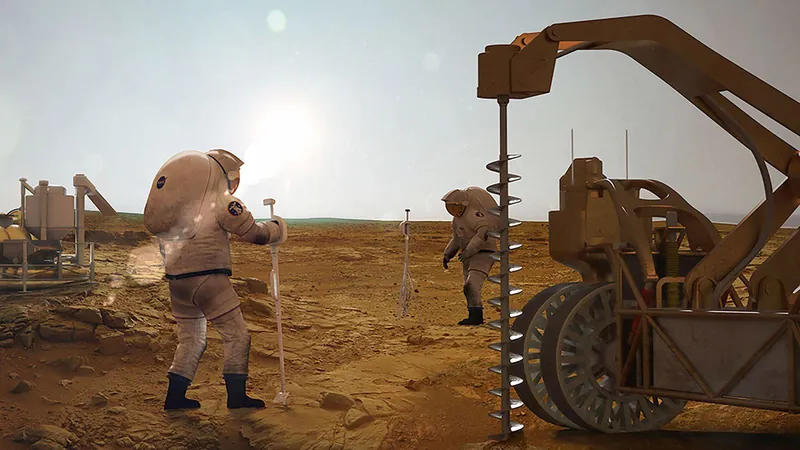
Is the US Losing Its Grip on Mars to China’s Ambitious Plans?
2025-06-30
Author: Sophie
NASA’s Mars Sample Return (MSR) program is facing challenges, while China forges ahead with its own plans to explore the Red Planet.
China’s Bold Mars Sample Return Mission
New insights reveal that China is gearing up to collect Mars samples through its Tianwen-3 mission. Set to launch in 2028, this ambitious plan aims to return at least 500 grams of Martian soil and rock back to Earth by 2031. A specialized drill will reach depths of over 6 feet to extract subsurface samples, and a robotic arm will gather additional surface material. Notably, a robotic helicopter is also in the mix, set to fetch samples from locations more than 300 feet away.
Why Mars Samples Matter
The implications of successfully retrieving Mars samples are profound, not only for scientific inquiry but also for upcoming human missions. It's widely accepted that collecting Martian materials is crucial for understanding possible life on the planet and for informing future manned missions.
Site Selection is Key
China’s selection of a landing site will hinge on a review of 86 potential locations, focusing on areas where evidence of life might have emerged or been preserved. According to a recent study, the mission will delve into nine scientific themes, most notably the search for current or past life.
Political Implications Back in the US
Meanwhile, back in the U.S., President Trump’s 2026 budget proposal raises concerns by cutting funding for programs deemed financially unsustainable, including the MSR. The budget suggests that priorities should shift towards manned missions to Mars, sidelining potentially groundbreaking robotic explorations.
Could This Be a New Space Race?
The budget cuts have sparked discussions among scientists and policymakers about the implications for America’s standing in space exploration. Some experts argue that the U.S. could forfeit its leadership role in planetary science to China if Congressional support is not secured.
Senators Respond with New Initiatives
In response, Senator Ted Cruz has introduced a comprehensive funding plan to propel America ahead of China in the new space race, allocating nearly $10 billion for Mars-specific technologies and initiatives.
Challenges Ahead for China’s Mission
However, there is skepticism regarding China’s capabilities to collect the high-priority samples gathered by NASA's Perseverance rover, which is actively collecting samples in Jezero Crater. Experts suggest that China's equipment may struggle to access these samples due to engineering limitations.
Collaborative Spirit vs. Competition
On one hand, Chinese scientists advocate for international cooperation in space exploration. Yet, geopolitical tensions and trade disputes complicate the feasibility of collaboration between the U.S. and China over the MSR project.
Examining Biohazard Risks
As China prepares to bring back potentially biologically active Mars samples, concerns arise over the risks they could pose to Earth’s biosphere. To address this, China plans to build a specialized facility for thorough testing of any returned samples to ensure they are safe.
What Lies Ahead?
As nations vie for dominance in space exploration, the competition over Mars samples could redefine leadership in planetary science. Experts suggest that while NASA has the experience and history of successful missions, the U.S. must act swiftly to maintain its edge in deep space exploration.
With the stakes higher than ever, the world watches to see who will emerge victorious in this thrilling race to the Red Planet.









 Brasil (PT)
Brasil (PT)
 Canada (EN)
Canada (EN)
 Chile (ES)
Chile (ES)
 Česko (CS)
Česko (CS)
 대한민국 (KO)
대한민국 (KO)
 España (ES)
España (ES)
 France (FR)
France (FR)
 Hong Kong (EN)
Hong Kong (EN)
 Italia (IT)
Italia (IT)
 日本 (JA)
日本 (JA)
 Magyarország (HU)
Magyarország (HU)
 Norge (NO)
Norge (NO)
 Polska (PL)
Polska (PL)
 Schweiz (DE)
Schweiz (DE)
 Singapore (EN)
Singapore (EN)
 Sverige (SV)
Sverige (SV)
 Suomi (FI)
Suomi (FI)
 Türkiye (TR)
Türkiye (TR)
 الإمارات العربية المتحدة (AR)
الإمارات العربية المتحدة (AR)